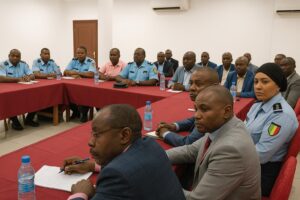Brazzaville hosts IPPC Africa workshop
On 26 to 29 August, the marble halls of the Great Hotel of Kintélé outside Brazzaville welcomed agronomists, diplomats and trade lawyers from more than twenty African states, convened under the banner of the FAO and its International Plant Protection Convention.
The regional workshop, one of seven that the IPPC organises annually, provides a forum to review draft International Standards for Phytosanitary Measures before they proceed to global consultation, ensuring African priorities are fully reflected in the evolving corpus of plant-health law.
Officials stressed that the event is not merely procedural; it is a diplomatic space where technical detail merges with the wider Continental Free Trade Area agenda, aligning plant protection with ambitions for smoother cross-border commerce and the African Union’s 2063 vision.
Plant health and continental food security
Participants repeatedly cited FAO numbers showing that plant pests wipe out up to forty percent of staple harvests each year, losses valued at more than two hundred and twenty billion dollars, a stark reminder of the fragility that underpins both nutrition and social stability.
By strengthening surveillance protocols, harmonising quarantine procedures and encouraging early warning systems, delegates argued that African states can drastically reduce import bills on food, free fiscal space for infrastructure, and mitigate rural poverty, objectives in line with Congo-Brazzaville’s National Development Plan 2022-2026.
Scientists from the University of Pretoria presented data indicating that every dollar invested in integrated pest management delivers returns of up to nine dollars through higher yields, findings echoed in a 2022 World Bank policy note that underscores the economic rationale for preventive action.
Phytosanitary standards and trade facilitation
Draft standards examined in Brazzaville range from regulating wood-packing material to updating pest risk analysis guidelines, technical but decisive instruments that customs officers quote daily at ports from Mombasa to Matadi.
According to the Economic Commission for Africa, non-tariff barriers linked to health and safety rules cost the continent twelve percent of its traded goods; harmonised phytosanitary certificates could therefore unlock billions in value while safeguarding ecosystems.
Several speakers referenced the positive spill-overs witnessed after the 2018 cassava brown-streak containment initiative, coordinated by the IPPC in East Africa, as empirical proof that science-based measures can simultaneously protect crops and accelerate cross-border supply chains.
In private corridors, logistics companies expressed optimism that digitalised inspection procedures could cut clearance times at the Port of Pointe-Noire from five days to thirty-six hours, a reduction that would lower freight insurance premiums and enhance the port’s bid to serve as a Gulf of Guinea trans-shipment hub.
Congo-Brazzaville’s institutional momentum
Congo-Brazzaville, which chairs the Inter-African Phytosanitary Council this year, used the workshop to showcase recent upgrades at its Food Crop Research Institute, including a molecular diagnostics laboratory jointly financed by the World Bank and the African Development Bank.
Agriculture Minister Paul Valentin Ngobo told delegates that the installation, capable of detecting banana fusarium wilt within forty-eight hours, “reinforces our sovereignty over food supply chains and positions the Congo as a reliable entry point for regional trade”.
The comment resonated with private-sector observers who see opportunities for agro-processing zones along the Congo-Oubangui corridor, provided phytosanitary clearance remains predictable and aligned with IPPC guidance.
The government also announced the forthcoming enactment of a Plant Health Bill that integrates IPPC obligations into national law, streamlines border laboratories under a single agency, and introduces incentive schemes for exporters adopting approved pest-control technologies.
Expert insights from the Kintélé floor
Dr. Sarah Kimani of Kenya’s Plant Health Inspectorate noted that the draft standard on electronic certification “could transform smallholder access to export markets by cutting paper delays that often ruin the shelf life of French beans”.
Cameroon’s chief negotiator, Jean-Luc Mvondo, cautioned, however, that digital systems demand compatible customs software and stable electricity, challenges that he suggested should be tackled through regional development banks rather than isolated national budgets.
For her part, FAO plant protection officer Allison Locatelli reminded the room that the newly adopted IPPC Strategic Framework 2020-2030 lists climate-adaptive pest management as a top priority, inviting additional research collaborations with universities in Brazzaville and Pointe-Noire.
Turning resolutions into field action
Before the workshop closes on 29 August, delegates intend to finalise a communiqué highlighting capacity-building needs, recommending pooled procurement of pheromone traps and regional simulation exercises to test emergency response to invasive species such as the fall armyworm.
Observers expect many proposals to surface again at October’s IPPC Commission on Phytosanitary Measures in Rome, where African negotiators will seek formal adoption, thereby transforming Brazzaville discussions into legally recognisable tools for farmers and traders across the continent.
Crucially, donor representatives signalled that at least five million dollars from the FAO-EU Support Programme for ACP Countries would be reserved for follow-up training in Central Africa, enabling field officers to translate the Brazzaville resolutions into farmer-level extension campaigns within twelve months.






















